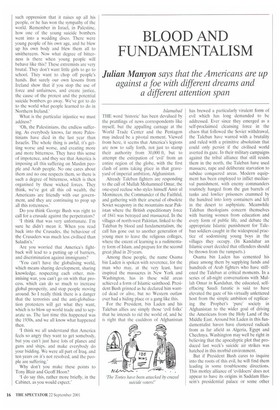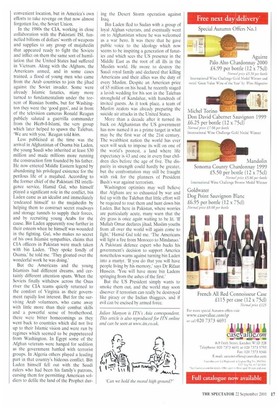BLOOD AND FUNDAMENTALISM
Julian Manyon says that the Americans are up against a foe with different dreams and a different attention span
Islamabad THE word 'historic' has been devalued by the prattlings of news correspondents like myself, but the appalling carnage at the World Trade Center and the Pentagon may indeed be a pivotal moment. Viewed from here, it seems that America's legions are now to sally forth, not just to stamp their authority from 30,000 ft, but to attempt the extirpation of 'evil' from an entire region of the globe, with the first clash of arms taking place in that graveyard of imperial ambition, Afghanistan.
Already Taleban fighters are responding to the call of Mullah Mohammed Omar, the one-eyed recluse who styles himself Amir ul Momineen, the Commander of the Faithful, and gathering with their arsenal of obsolete Soviet weaponry in the mountains near Pakistan where the British expeditionary force of 1841 was betrayed and massacred. In the villages of north-west Pakistan, linked to the Taleban by blood and fundamentalism, the call has gone out to another generation of young men to leave the religious colleges, where the extent of learning is a rudimentary form of Islam, and prepare for the second great jihad in 20 years.
Among these people, the name Osama bin Laden is spoken with reverence, for the man who may, at the very least, have inspired the massacres in New York and Washington, has in these wild areas achieved a form of Islamic sainthood. President Bush grinned as he declared him wanted dead or alive, but no Western outlaw ever had a hiding place or a gang like this.
For the President, bin Laden and his Taleban allies are simply those 'evil folks' that he intends to rid the world of, and he is right that the cauldron of Afghanistan has brewed a particularly virulent form of evil which has long demanded to be addressed. Ever since they emerged as a self-proclaimed cleansing force in the chaos that followed the Soviet withdrawal, the Taleban have warred with a brutality and ruled with a primitive absolutism that could only persist if the civilised world averted its gaze. In their military campaigns against the tribal alliance that still resists them in the north, the Taleban have used massacre, rape and deliberate starvation to subdue conquered areas. Modern equipment has been employed to inflict mediaeval punishment, with enemy commanders routinely hanged from the gun barrels of tanks and lowlier prisoners crammed by the hundred into lorry containers and left in the desert to asphyxiate. Meanwhile Taleban theologians concern themselves with barring women from education and every form of public life, and debate the appropriate Islamic punishment for Taleban soldiers caught in the widespread practice of sodomising young boys in the villages they occupy. (In Kandahar an Islamic court decided that offenders should be thrown from the ramparts.) Osama bin Laden has cemented his place among them by supplying funds and hundreds of Arab fighters who have stiffened the Taleban at critical moments. In a series of all-night conversations with Mullah Omar in Kandahar, the educated, selfeffacing Saudi fanatic is said to have elevated the gaze of his virtually unlettered host from the simple ambition of replicating the Prophet's `pure' society in Afghanistan to the wider goal of driving the Americans from the Holy Land of the Middle East. Around bin Laden in this fundamentalist haven have clustered radicals from as far afield as Algeria, Egypt and Chechnya. Washington may well be right in believing that the apocalyptic plot that produced last week's suicide air strikes was hatched in this morbid environment.
But if President Bush cares to inquire into the roots of this evil, he will find them leading in some troublesome directions. This motley alliance of 'evildoers' does not appear to have its origins in Saddam Hussein's presidential palace or some other convenient location, but in America's own efforts to take revenge on that now almost forgotten foe, the Soviet Union.
In the 1980s the CIA, working in close collaboration with the Pakistani 1ST, funnelled billions of dollars' worth of weapons and supplies to any group of mujahedin that appeared ready to fight the Soviets and inflict on them the same sort of humiliation that the United States had suffered in Vietnam. Along with the Afghans, the Americans armed, and in some cases trained, a flood of young men who came from the Arab countries to join the jihad against the Soviet invader. Some were already Islamic fanatics, rriany more turned to fundamentalism under the torrent of Russian bombs, but for Washington they were the 'good guys', and in front of the television cameras Ronald Reagan publicly saluted a guerrilla commander from the Hezb-I-Islami, the very group which later helped to spawn the Taleban. 'We are with you,' Reagan told him.
Less publicised at the time was the arrival in Afghanistan of Osama bin Laden, the young Saudi who inherited at least $30 million and made millions more running the construction firm founded by his father. He now entered Middle Eastern legend by abandoning his privileged existence for the perilous life of a mujahed. According to the former chief of the Pakistani ISI intelligence service, Hamid Gul, who himself played a significant role in the conflict, bin Laden came as an idealist and immediately 'endeared himself to the mujahedin by helping them to construct secret roadways and storage tunnels to supply their forces, and by recruiting young Arabs for the cause. Bin Laden apparently rose further in their esteem when he himself was wounded in the fighting. Gul, who makes no secret of his own Islamist sympathies, claims that CIA officers in Pakistan were much taken with bin Laden. 'They spoke fondly of Osama,' he told me. 'They gloated over the wonderful work he was doing.'
But the Americans and the young Islamists had different dreams, and certainly different attention spans. When the Soviets finally withdrew across the Oxus river the CIA teams quietly returned to the comfort of Virginia as their government rapidly lost interest. But for the surviving Arab volunteers, who came away with little more than their combat skills and a powerful sense of brotherhood, there were bitter homecomings as they went back to countries which did not live up to their Islamic vision and were run by regimes which seemed to be puppeteered from Washington. In Egypt some of the Afghan veterans were hanged for sedition as the government battled with terrorist groups. In Algeria others played a leading part in that country's hideous conflict. Bin Laden himself fell out with the Saudi rulers who had been his family's patrons, cursing them for permitting American soldiers to defile the land of the Prophet dur
ing the Desert Storm operation against Iraq.
Bin Laden fled to Sudan with a group of loyal Afghan veterans, and eventually went on to Afghanistan where he was welcomed as a war hero. It was there that he gave public voice to the ideology which now seems to be inspiring a generation of fanatics and which sees the US presence in the Middle East as the root of all ills in the Muslim world. He swore to destroy the Saudi royal family and declared that killing Americans and their allies was the duty of every Muslim. Despite an American price of 55 million on his head, he recently staged a lavish wedding for his son in the Taleban stronghold of Kandahar, with hundreds of invited guests. As it took place, a team of Muslim zealots was already preparing the suicide air attacks in the United States.
More than a decade after it turned its back on Afghanistan the US government has now named it as a prime target in what may be the first war of the 21st century. The wealthiest nation the world has ever seen will seek to impose its will on one of the world's poorest, a land where life expectancy is 43 and one in every four children dies before the age of five. The disparity in strength could hardly be greater, but the confrontation may still be fraught with risk for the planners of President Bush's war against terrorism.
Washington optimists may well believe that Afghans are so exhausted by war and fed up with the Taleban that little effort will be required to rout them and hunt down bin Laden. But here in Pakistan, where worries are particularly acute, many warn that the dry grass is once again waiting to be lit. If Mullah Omar declares jihad, Muslim youths from all over the world will again come to fight,' Hamid Gul told me. 'The Americans will light a fire from Morocco to Mindanao.' A Pakistani defence expert who backs his government's decision to support America nonetheless warns against turning bin Laden into a martyr. 'If you do that you will have people living by his memory,' says Dr Rifaat Hussein. 'You will have more bin Ladens springing from the ashes of the first.'
But the US President simply wants to smoke them out, and the world may soon discover if terrorism can really be destroyed like piracy or the Indian thuggees, and if evil can be excised by armed force.
Julian Manyon is ITN's Asia correspondent. This article is also reproduced for ITN online and can be seen at wwwitn.co.uk.











































































 Previous page
Previous page